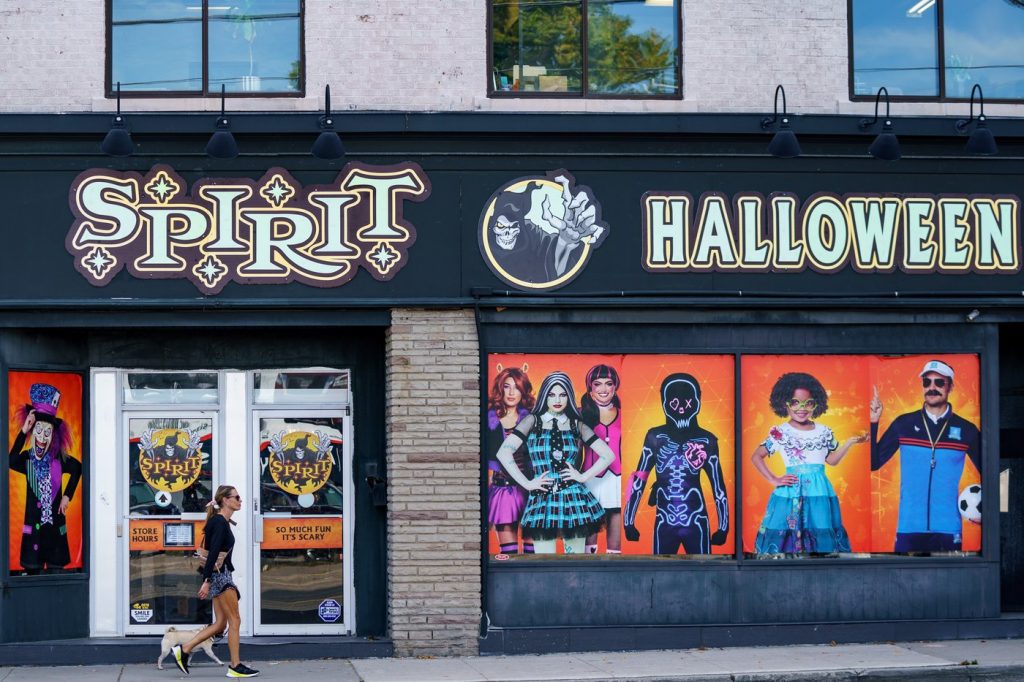TORONTO — The commercial real estate sector is currently grappling with the challenge of filling large, vacant units, a situation heightened by the closure of Hudson’s Bay, Canada’s oldest department store chain. This closure has left landlords of 25 former Hudson's Bay locations embroiled in legal battles and many others actively seeking tenants to fill hundreds of thousands of square feet of space, with the ominous specter of long-term vacancies looming.
This Halloween season, however, has brought a glimmer of hope as Spirit Halloween, the well-known U.S. costume and decor retailer, has taken over some of these empty spaces, including former locations of Sears, Peavey Mart, Bed Bath & Beyond, and Decathlon. Spirit Halloween's brief occupancy provides landlords with short-term rent revenues and the promise of increased foot traffic during the busy Halloween season, although the retailer plans to vacate these spaces shortly after the holiday.
Short-term commercial rentals are not a new phenomenon; they have been utilized by seasonal businesses and promotional events for some time. Nonetheless, the current availability of prime retail spaces has attracted renewed attention to this practice. Kate Camenzuli, vice-president of retail at commercial real estate firm CBRE, explained that while short-term tenants are not a novel idea, they are now being welcomed in prominent locations—a significant shift from previous trends.
Large spaces within desirable malls and shopping districts were rarely accessible to short-term tenants like Spirit Halloween in the past. This landscape has changed over the last decade, largely due to the exit of big-box retailers. Although some major players such as grocery chains, Costco, Canadian Tire, Walmart, Ikea, Simons, and Holt Renfrew are expanding, they are not filling the void left by departing department stores.
Camenzuli noted that finding new tenants to backfill these spaces has become increasingly challenging, stating, “Backfilling all of the department stores with other department stores is a thing of the past.” This has prompted landlords to explore unconventional tenants and alternate uses for their properties, including pickleball courts, roller rinks, food halls, and even residential apartments.
Despite these creative strategies, most incoming retail tenants seek much smaller spaces, typically ranging from 6,000 to 7,000 square feet. This mismatch between the size of available properties and tenant demand has changed the dynamics within the market, leading to a national retail vacancy rate of approximately 4.2% according to CBRE. Real estate firm JLL recently highlighted that retail availability rates are now below historical averages, with cities like Toronto and Montreal experiencing unprecedented lows. However, signs of a market softening are emerging, as rental growth has dipped below historical norms.
The larger units, especially those exceeding 15,000 square feet, pose more significant challenges. Landlords either have to make substantial concessions to attract tenants or incur immense costs to subdivide large properties into smaller units. Allowing these spaces to remain vacant results in lost rent and diminished relevance within the marketplace.
Spirit Halloween's business model presents a mutually beneficial solution for landlords navigating these vacancies. The retailer's short-term leases reduce their overhead by avoiding the complexities of maintaining a large real estate portfolio throughout the year. In contrast, landlords gain a temporary tenant that helps alleviate the burden of vacant properties until a more permanent occupant can be secured. Alex Avery, chief executive of Primaris Real Estate Investment Trust, noted the advantages of having Spirit Halloween occupy their properties while they search for long-term tenants.
Primaris owns several properties previously occupied by Hudson’s Bay, with five sites recently returned to their management, collectively spanning 532,100 square feet. The closure of Hudson's Bay contributes to a projected loss of $5.5 million in annualized revenue for Primaris, with estimated repurposing costs ranging from $50 million to $60 million. Nevertheless, Avery expressed optimism about finding long-term tenants once the spaces are ready, citing a high level of demand coupled with limited new supply in the market.
As the retail landscape evolves, the presence of temporary tenants such as Spirit Halloween suggests a shift in strategy for both landlords and businesses. Although the future may pose challenges for seasonal retailers in securing space, the current environment provides ample opportunities for filling otherwise daunting vacancies.











